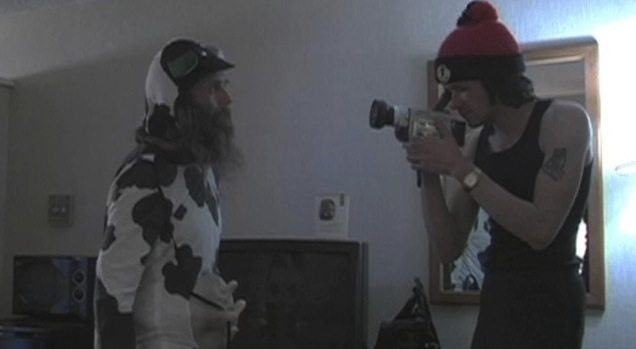
 Ventura, California, 2005. Ten years after playing in 90’s hits movies such as Independence Day, Never Been Kissed, and Detroit Rock City, Giuseppe Andrews lives with his father in the Ramona Trailer Park in Ventura, California… and he makes movies. Giuseppe Makes a Movie is a documentary portraying an interesting case – a former Hollywood child star rebelling against the system that first gave him recognition. Directing underground movies right next to the city famous for producing some of the biggest commercial films is indeed pretty impudent. And this movie cleverly highlights the links between his past life and his present work.
Ventura, California, 2005. Ten years after playing in 90’s hits movies such as Independence Day, Never Been Kissed, and Detroit Rock City, Giuseppe Andrews lives with his father in the Ramona Trailer Park in Ventura, California… and he makes movies. Giuseppe Makes a Movie is a documentary portraying an interesting case – a former Hollywood child star rebelling against the system that first gave him recognition. Directing underground movies right next to the city famous for producing some of the biggest commercial films is indeed pretty impudent. And this movie cleverly highlights the links between his past life and his present work.
Distanced from Hollywood standards, Andrews’ work embodies the most invisible – but also the most dynamic – part of contemporary cinematographic creation. As one of his actors describes it, the verb “make” is not used randomly: Andrews is part of what is usually called the American avant-garde, classified as such because many of his films are homemade. He produces, films, and edits his own movies. In a scene of Giuseppe Makes a Movie, the director addresses the issue posed by the definition of an “independent movie”: while most indie movies require millions of dollars, he believes that a few hundreds of dollars would be enough – as long as you can find people who can work for free! His crew is indeed mainly made of homeless people he met in the street. A few of them of them are introduced in the movie: Vietnam Ron, a homeless person playing the main character of the movie, Sir Big Foot Georg, Miles Douglas, Wait Dongo, his girlfriend Mary, and even the heartbreaking Tiffany, a girl who was abused by her boyfriends.
Giuseppe’s work is actually all about “the vibe” and spontaneity of filmmaking, implying improvisation as a technique of acting for example. As the movie shows it, Andrews is able to connect with his crew to turn film shootings into insane rituals, provoking actors into executing the most absurd things, such as disguising themselves as cows. And the most striking part of his work is, in the end, its violence. The harshness of the mechanical sex scenes, the irrationality of the situations depicted, as well as the automatic repetition of lines, are so many proofs of the violence that pervades his work – a violence that has an obvious political significance. Indeed, Giuseppe defines his crew of homeless people and himself as “outsiders”, and his movies have a cathartic function because they take an opposing view from most Hollywood productions: they convey a form of social anger that is held back from mainstream cinema – as if they were its subconscious part. So it is easy to understand why the relationship the director shares with his crew-members is so important: this band of misfits is indeed involved in a meaningful shared project.
In the end, Giuseppe Makes a Movie gives an interesting insight into a singular creative process and highlights the links between the director’s past and his present, between Hollywood and the underground; how they coexist and interact together despite their differences.